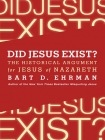Did Jesus Exist? - The Historical Argument for Jesus of Nazareth by Bart Ehrman (ebook reader browser .TXT) 📗

- Author: Bart Ehrman
Book online «Did Jesus Exist? - The Historical Argument for Jesus of Nazareth by Bart Ehrman (ebook reader browser .TXT) 📗». Author Bart Ehrman
Many of my students are surprised, dismayed, and sometimes even depressed (or, alternatively, liberated!) as they acquire historical knowledge about the New Testament. They hear, often for the first time, that we do not know who the authors of the Gospels actually were other than that they were almost certainly not the Aramaic-speaking lower-class peasants who made up the earthly disciples of Jesus. They learn that the different Gospels present very different portrayals of who Jesus was, what he stood for, and what he preached and that the New Testament tales of Jesus are full of discrepancies in matters both large and small. Many students are especially taken aback when they realize that even though the Gospels appear to be presenting historical accounts of Jesus’s life, much of the material in the Gospels in fact is not historically reliable.
I do not discuss mythicists in the class since, as I’ve repeatedly indicated, the mythicist view does not have a foothold, or even a toehold, among modern critical scholars of the Bible. But knowing that Jesus really existed is only the beginning of the quest for the historical Jesus. Let’s say that he did exist. What then? What was Jesus like? What do we know about his life? What did he stand for? What did he preach and teach? What did he do? What kinds of controversies was he involved in? How did he come to be crucified? These are the questions that my students are particularly keen to address once they realize that the Gospels do not preserve completely accurate eyewitness testimonies. And they are the issues that I will be addressing in this chapter and the one that follows.
Certainties and Uncertainties in the Life of Jesus
AS I HAVE REPEATEDLY emphasized, different scholars come to radically different conclusions about how to understand the life of the historical Jesus. This is almost entirely because of the nature of our sources. We have seen that these sources are more than ample to establish that Jesus was a Jewish teacher of first-century Roman Palestine who was crucified under Pontius Pilate. As we will see in a moment, they are also ample for knowing a few more things about his life, as virtually every researcher agrees. But they are not ample when it comes to wanting to know more details, in greater depth, about what he actually said, did, and experienced. Some of the sources are sparse to the point of being completely frustrating. How we wish that Josephus, Tacitus, and, say, the letter of James had much more to say! Others are so slanted in their presentation that they have to be handled like an inordinately hot potato. The Infancy Gospel of Thomas, for example, and the Proto-Gospel of James do not give us much to go on if we want to know about the life of the historical Jesus, even his early life. Paul gives us some good, useful information, but there is not much there if we want extensive descriptions about what Jesus said, did, and experienced. The canonical Gospels are full of information, but they are at odds with one another in one detail after the other, and their overall portrayals of Jesus differ from one another, sometimes radically. As a result, the information they provide needs to be handled with a deft critical touch.
Even given these problems, there are a number of important facts about the life of Jesus that virtually all critical scholars agree on, for reasons that have in part been shown and that in other ways will become increasingly clear throughout the course of this chapter and the next. Everyone, except the mythicists, of course, agrees that Jesus was a Jew who came from northern Palestine (Nazareth) and lived as an adult in the 20s of the Common Era. He was at one point of his life a follower of John the Baptist and then became a preacher and teacher to the Jews in the rural areas of Galilee. He preached a message about the “kingdom of God” and did so by telling parables. He gathered disciples and developed a reputation for being able to heal the sick and cast out demons. At the very end of his life, probably around 30 CE, he made a trip to Jerusalem during a Passover feast and roused opposition among the local Jewish leaders, who arranged to have him put on trial before Pontius Pilate, who ordered him to be crucified for calling himself the king of the Jews.
Nearly all critical scholars agree at least on those points about the historical Jesus. But there is obviously a lot more to say, and that is where scholarly disagreements loom large—disagreements not over whether Jesus existed but over what kind of Jewish teacher and preacher he was. Some scholars have said that he is principally to be thought of as a first-century Jewish rabbi whose main concern was teaching his followers how best to follow the Law of Moses. Others have said that he was a Jewish holy man, like those we learn about from Josephus, a kind of shaman reputed to do spectacular deeds because of his unusual powers. Others have maintained that he is best understood as a political revolutionary who was preaching armed rebellion against the Roman Empire. Still others have claimed that he was a social reformer who urged the Jews of his time to adopt an entirely different lifestyle, for example, by embracing new economic principles as a kind of proto-Marxist or different social relationships as a kind of proto-feminist. Yet others have suggested that he





Comments (0)